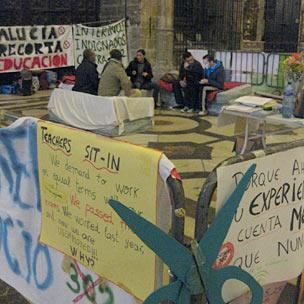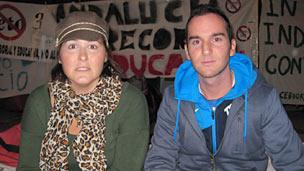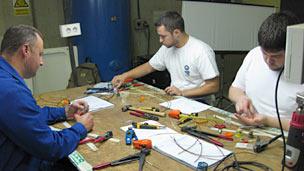Spain economic crisis: Young, professional and jobless
- Published

Protesters say their future looks very dark
There is now a new sight for visitors to Seville's enormous gothic cathedral - at the far end of the nave beneath a vast stained-glass window.
As the music from morning mass drifts through loudspeakers, curious tourists pause and snap photographs.
But there is nothing religious about this sight: it's a sit-in protest by young teachers who say cuts in spending on education have cost them their jobs.
"We'll stay until this situation is resolved," insists Paula, laid-off after the local government changed the rules on hiring supply teachers. The protesters believe the motive was to save money.
So they have been here for more than seven weeks, protesting in shifts, behind metal barricades draped with banners explaining their cause in multiple languages.
"At the moment our future is very dark," complains Zeus, perched on a pile of mattresses.
He says about 1,000 teachers have been affected by the cuts.
"It's possible I'll have to get another job, maybe in a supermarket. I just don't know," he says.
Jaw-dropping stats
The cathedral sit-in is the latest - most striking - illustration of Spain's biggest problem.
The economic crisis has left 31% of the workforce unemployed in the southern region of Andalucia, well over the national average.
For under-25s, like some of the protesting teachers, the figure is a jaw-dropping 53.7%.
As regional governments struggle to contain spending, the lay-offs have spread from industry and construction to the public sector.
So it is unsurprising that employment is the big issue in campaigning for Spain's general election this weekend.

Nearly 54% of Andalucia's under-25s are currently unemployed
"Jobs first!" is the slogan of the Popular Party (PP) that is now leading all opinion polls, even in this historic Socialist heartland.
The party points out that more than 4,000 jobs a day have been lost under the current Socialist government, accusing it of chronic mismanagement.
"Back in the 1990s, under the PP, we promoted fiscal stability, economic reform. And the Spanish economy was able to create five million jobs in eight years," says Baudilio Tome, co-ordinator of the opposition party's electoral programme.
"The challenge is to put the conditions for the economy to grow again and create jobs. It's not easy," he admits.
Re-orienting workforce
The PP plans set out so far include more training contracts for young people, an apprenticeship system and reforming collective bargaining procedures to allow firms more control over wages and conditions - to encourage them to hire.
"It's really hard. There comes a point when it all overwhelms you," admits Juan Sanchez, who lost his job as an electrician three years ago, and has been unable to find anything since.
"It used to be easy, you'd make decent money in construction. Lots of my friends left school to get jobs and now they've lost them," he explains, during a break in a government funded retraining scheme for the unemployed.
It's part of Spain's attempt at a mass reorientation of its workforce, since the housing bubble burst and crippled the huge construction sector.
Seville, home to an Airbus plant assembling the A400M military transport plane, is focusing its hopes on aeronautics.
This year, more than 100 unemployed people like Juan will get free, practical training in aeronautical electronics or design.
An agreement with the local government allows about half of them to continue their training at Airbus with the hope of a job at the end of it. That rate's expected to increase when the A400M finally enters full production.
"I hope this works," says Juan, who's already completed four other courses here and is still jobless. "If I wasn't able to live at home with my father, I'd be under a bridge by now."
He does not believe the politicians, now promising jobs.
Protest vote
With 800,000 people currently at university, Spain prides itself on having the best prepared young generation in its history. It's a vital resource for the country's eventual recovery.
But at one of the country's biggest universities in Seville, students are nervous about their future.
"It's really difficult here to find a job, not only in our subject but if you want to clean stairwells. It's that bad!" says Gabriel Gurtez, who is 22 and studies English.

Some unemployed graduates have been offered a retraining programme
He says he plans to post a blank voting slip in Sunday's elections in protest.
"There's teachers, lawyers, people with degrees, working in bread stores! I don't think this country will recover in 10 years," Gabriel believes.
Some of his friends gathered in the cloisters of this former royal tobacco factory are more hopeful, assuming a new government takes the reins.
"I think they (the PP) could do better," argues Miriam Franco, who says the current government focused too much on social reform, at the expense of the economy.
"We're really disappointed with the socialists. We could vote the PP to see if they make a difference."
But they all agree change, if it comes, will be slow.
"Maybe things will be better in six years, if the economy changes," suggests Patricia, who's 20 and about to participate in her first general election. She will be voting for the PP.
"But if I finish my degree now, it's impossible to find work," she adds.
Her brother has already moved abroad, and Patricia is fully expecting to do the same
"You have to go out of Spain to seek a job," she says. "It's crazy!"